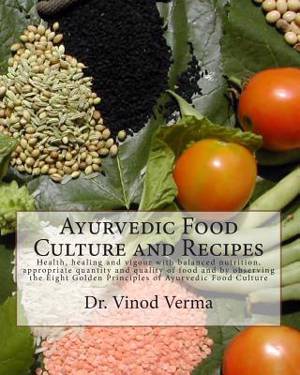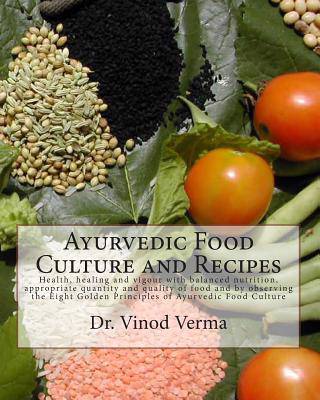
- Afhalen na 1 uur in een winkel met voorraad
- Gratis thuislevering in België vanaf € 30
- Ruim aanbod met 7 miljoen producten
- Afhalen na 1 uur in een winkel met voorraad
- Gratis thuislevering in België vanaf € 30
- Ruim aanbod met 7 miljoen producten
Omschrijving
Ayurvedic Food Culture and Recipes by Dr. Vinod Verma Ayurvedic food means a harmonious combination of food products prepared with various seeds, herbs and spices in order to create equilibrium in your body and to rejuvenate you. This food should increase 'ojas' (immunity and vitality) in the body. The preparation of the food, the way it is consumed and its quantity also play a significant role. The quality of the food should be according to the place, weather, climate, specific situation (like fatigue, sickness, stress etc.) and the fundamental nature of an individual. The food preparation should be balanced in relation to the five fundamental elements (ether, air, fire, water and earth) of which the whole universe is made and in addition the equilibrium should be sought in the above-described factors. It is essential to know all these basic factors to comprehend properly about the Ayurvedic food preparations. This book is a key to health for those who wish to live a long, healthy and disease-free life with optimum energy level. Ayurvedic cooking does not mean 'Indian cooking' and Ayurvedic cooking preparations do not have to be Indian. Ayurvedic principles are largely followed in many traditional homes in India. Nevertheless, not all Indian foods are prepared according to the principles of Ayurveda. Most existing books on Ayurvedic cooking are simply Indian cookbooks and those too at times are westernised. For example, the wheat bread eaten in most Indian homes is made with dough prepared simply with flour and water and this flat bread is baked on an iron pan. It is called chapati and it is freshly made for each meal. There is no salt or fat in the chapatis. They may be slightly smeared with ghee (clarified butter) on the top after they are ready. The chapatis are eaten with various vegetable or meat preparations, which are salted. However, to my utter surprise, many of the so called Ayurvedic cookbooks had instructed to add salt in the dough for chapatis, obviously to make the taste comparable to the salted bread eaten in the West. There are also many deep-fried, oily and fatty recipes written under the name of Ayurvedic cooking. In the ancient texts of Ayurveda, these foods are specifically prohibited and when eaten, they should be made with particular spices that promote digestion. However, these spices are not mentioned in the recently published books. I have written this book to give you an over all understanding of the Ayurvedic concepts of food preparation by illustrating the scientific reasons for using particular spices in particular preparations. This way, you will not only learn the limited Ayurvedic recipes but will also be able to use the specific products in your own recipes at an appropriate time in order to make them according to the Ayurvedic principles of balance and harmony. Many recipes described in this book are specifically designed and are invented by me to suit our modern way of life, available equipment and time constraint. Since I have spent a substantial part of my adult life in Europe and also three years in the USA, and have travelled around the world, my recipes are very often cross-cultural but modified according to the principles of Ayurveda. Dr Verma is a world renowned scientist who has studied Neurobiology in Paris in the University of Pierre et Marie Curie (old Sorbonne) and has worked in prestigious places like National Institutes of Health, Bethesda, USA and Max Planck Institute in Germany. She resolved to do research in health rather than disease after having worked in a pharmaceutical company in Germany in 1984. She was the first one to bring scientific aspects of Ayurveda to the West. Her books on Yoga and Ayurveda a comprehensive and holistic scientific system appeared in late eighties and early nineties in various European languages. She has written 23 books on various aspects of health until now. For more details see www.ayurvedavv.com
Specificaties
Betrokkenen
- Auteur(s):
- Uitgeverij:
Inhoud
- Aantal bladzijden:
- 262
- Taal:
- Engels
Eigenschappen
- Productcode (EAN):
- 9781495233159
- Verschijningsdatum:
- 17/01/2014
- Uitvoering:
- Paperback
- Formaat:
- Trade paperback (VS)
- Afmetingen:
- 203 mm x 254 mm
- Gewicht:
- 526 g

Alleen bij Standaard Boekhandel
+ 169 punten op je klantenkaart van Standaard Boekhandel
Beoordelingen
We publiceren alleen reviews die voldoen aan de voorwaarden voor reviews. Bekijk onze voorwaarden voor reviews.









